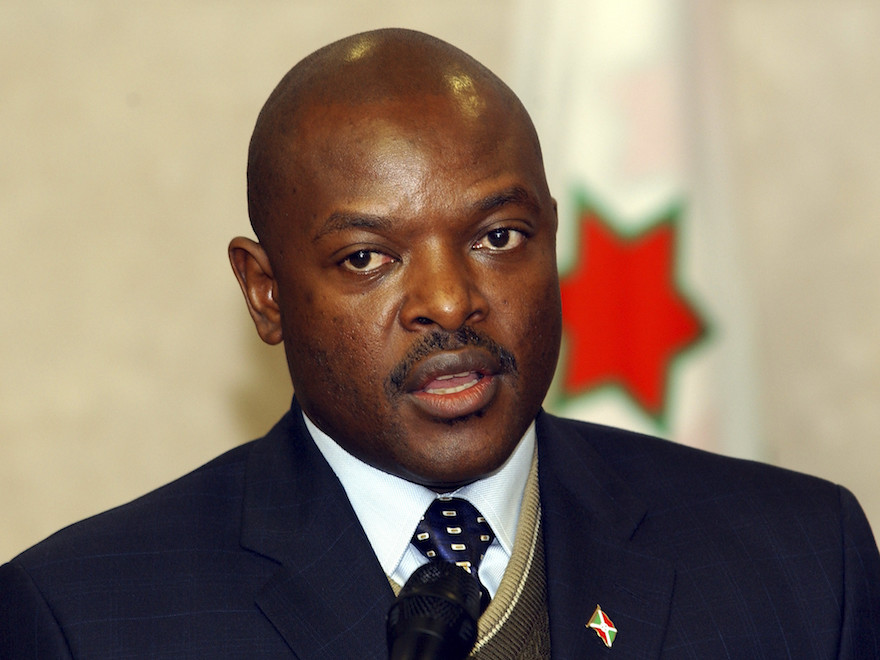BERLIN | ADDIS ABABA (IDN) – Within less than a week of African leaders rejecting repeated demands to deploy troops of the African Union in strife-torn Burundi, the 54-nation group has appointed a high-level delegation of five African presidents to negotiate with factions in the East African country over the possible deployment of an African peacekeeping mission.
Much to the disappointment of UN Secretary-General Ban Ki-moon, the U.S. and the European Union, the 54-nation African Union (AU) summit in Ethiopia’s capital Addis Ababa dismissed on February 1 the proposal to deploy the group’s troops in Burundi – if necessary, without the consent of the landlocked country in the African Great Lakes region of East Africa.
But, as Kenya’s Daily Nation reported on February 5, the newly elected AU Assembly Chairman and President of Chad Idriss Deby named five leaders from east, central, western, southern and northern Africa to follow up with talks, after the AU Summit failed to enforce the deployment in the face of Burundi’s rejection of the forces.
In fact Burundi rejected the decision and termed the force as an “invasion” rather than a peacekeeping mission – but did not say that the AU “peacekeeping” missions rely on the U.S. Africa Command (AFRICOM) for weapons, training, intelligence, logistics, organization and command.
Nor did it emphasize that the African Union, with headquarters in Addis Ababa, Ethiopia, was established in 1963 as the Organization of African Unity (OAU) to eradicate colonialism and improve economic, cultural, and political cooperation in Africa.
A statement from the AU headquarters in Addis Ababa said the five leaders – one each from the continent’s regional blocs – will “consult the government and other actors of Burundi, on inclusive dialogue and deployment of the African Mission prevention and protection in Burundi (MAPROBU) if accepted by the Government of Burundi”.
The five members of the high-level delegation are: Mauritanian leader Mohamed Ould Abdel Aziz, South African President Jacob Zuma, President Macky Sall of Senegal, Ali Bongo Ondimba of Gabon and Ethiopian Prime Minister Hailemariam Desalegn.
Though the AU Peace and Security Council had argued that some 5,000 troops will be charged with preventing ‘invasion’ of foreign rebels and guard civilians, President Pierre Nkurunziza of Burundi rejected the offer, saying his government was able to control the situation.
But even with that endorsement, the AU did not clarify which countries would contribute those troops, or how they will be financed.
Bujumbura already accuses neighbouring Rwanda of training rebels to destabilise its government, a charge Kigali denies.
The violence in Burundi was triggered in April 2015 after President Nkurunziza announced his controversial third term bid. He won the contentious elections in June 2015, but international observers including the U.S and the European Union said they were neither free nor fair.
The African Union, for the first time in history, did not send observers to the elections. The UN estimates that about 400 people have been killed and 220,000 others displaced by the violence.
What observers refer to as the ‘Burundi debacle’ acquires significance not the least because during three days of wide-ranging meetings with AU leaders in Addis Ababa UN Secretary-General Ban repeatedly warned that the deteriorating situation in Burundi is “a source of great concern, not only in the region, but in the continent and the world”.
“The United Nations has been always urging, particularly Burundian political leaders, including President [Pierre] Nkurunziza, to engage in inclusive dialogue, listening carefully the concerns and aspirations of Burundian people,” Ban told reporters in January 31 during a press conference summing up his activities in the Ethiopian capital.
Ban commended the leadership of the East African Community (EAC) and the AU for their consistent diplomatic efforts to bring peace and stability in Burundi. “Unfortunately, the situation […] has been deteriorating. Many people have been killed and almost every day, we see such kind of violence taking place,” he said, noting that perhaps one million people have been affected by the political instability and humanitarian crisis set off in April 2015 when President Nkurunziza announced a run for a third term.
While he has been raising the issue with a range of African leaders, including AU Commissioner Nkosazana Zuma, the UN chief said that first and foremost, it is not the United Nations or the leaders in neighbouring countries “it is [the] Burundian people and Government that should resolve this issue through inclusive dialogue. Since we have not seen much expected outcome, it has become source of great concern, not only in the region but in the continent, and in the world.”
He went on to note that on January 30 he had met with the Second Vice-President of Burundi Joseph Butore, among other officials, stressing that the United Nations is “very much committed to bring peace and stability, and human dignity to Burundian people.”
Responding to questions on the deployment of AU peacekeepers in Burundi, Ban stressed that the Burundian Government had not agreed to such deployment and that as far as the UN is concerned, in accordance with UN Security Council resolutions and with the consent of the Government, a small political mission led by Special Advisor Jamal Benomar had been set up. “We are now trying to use this special political mission as a way, as a means, to help facilitate a dialogue. [This work] is still ongoing,” he explained.
“I have been urging African leaders to speak and act in one voice. It is a matter of human dignity and human rights. The longer this situation continues, the more people will be killed and affected […] We cannot wait any longer, that is why it is a matter of urgency, that I am urging African leaders to act in one voice, and also particularly urging President Nkurunziza and his Government to listen very carefully and engage in inclusive dialogue,” the Secretary-General said. [IDN-InDepthNews – 7 February 2016]
Photo: Burundi’s President Pierre Nkurunziza | Credit: afrikareporter.com

